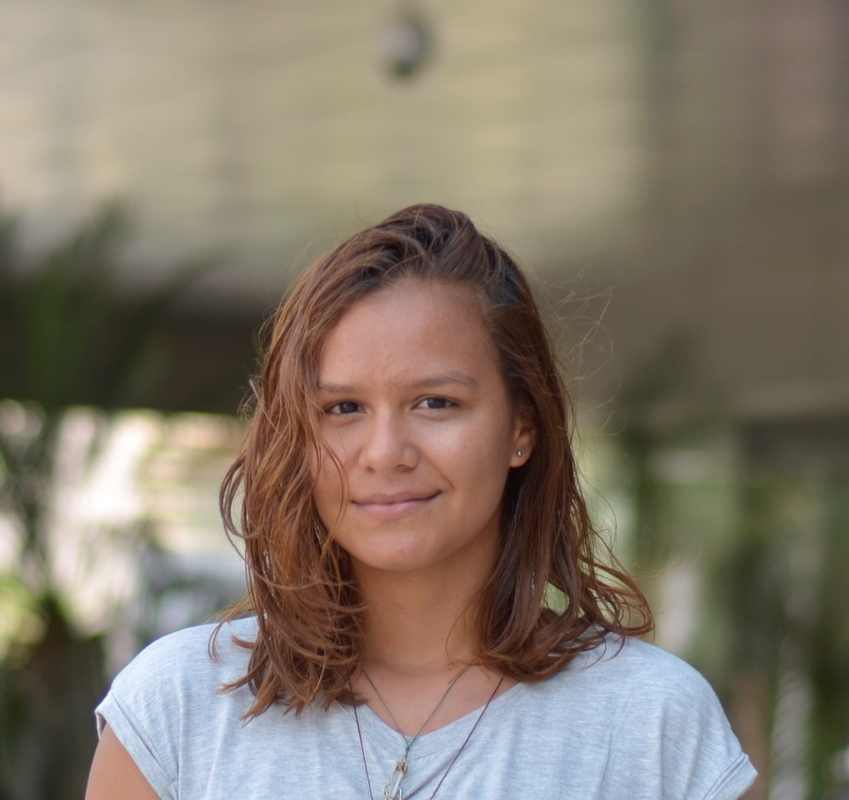Student Focus: Alejandra Ortega

KAUST Ph.D. student Alejandra Ortega joined the University in 2015 and completed her master's degree before beginning her Ph.D. studies in bioscience. File photo.
By David Murphy, KAUST News
KAUST Ph.D. student Alejandra Ortega sees herself as someone who tries to find the bright side in every situation and person she encounters, and she thrives off a need for diversity.
"I cannot do the same thing without having breaks...I complement my [Ph.D.] work with other activities, such as taking part in sporting activities or attending KAUST community events," she said.
Ortega's research career began in her native Colombia, where she completed her two bachelor's degrees—a B.A. in history ('11) and a B.Sc in biology ('14)—at the Universidad del Valle, Cali. She joined KAUST in 2015 and went on to complete her master's degree in marine biology at the University. She is now pursuing her Ph.D. in bioscience as a member of KAUST Professor Carlos Duarte's research group.
Her current doctoral research focuses on carbon fluxes of mangrove, seagrass and macroalgae in the Red Sea and in the global ocean. In particular, she combines metagenomes and environmental DNA barcoding to estimate the contribution of marine plants to blue carbon sequestration pools. Blue carbon is the carbon stored in marine habitats that provide ecosystem services essential for climate adaptation and resilience along the coasts.
"I am using environmental DNA (eDNA) analyses as an accurate method to estimate the relative contribution of marine macrophytes to blue carbon stocks," Ortega explained. "Knowing the contribution of these marine macrophytes is relevant to the protection of marine vegetated ecosystems."
"I guess every researcher thinks that his or her work will change the world and give him or her a Nobel Prize," she continued. "My research does [none] of that, but [it] will certainly help environmental managers and policy makers to estimate better [the] blue carbon budget and hopefully implement more projects on [the] conservation of marine vegetated habitats like the beautiful seagrass meadows, mangrove forest and saltmarshes."
Outside of her research, Ortega is passionate about community building, the arts and humanities and science communication. During her time at the Universidad del Valle, she worked as a junior reporter for the university's literary publication La Palabra, and in May 2017, Ortega and Bruno Pulido Ponce de León, María José Mosqueira Santillán and Sandra Patricia González López, three fellow KAUST Ph.D. students, co-founded the Science Crossroads Initiative (SCI), a KAUST science communication initiative.
The SCI aims to introduce the KAUST community to a variety of contemporary topics at the intersection of science and other disciplines, such as philosophy, history and the arts. Through seminars and other activities, the SCI team fosters and nourishes curiosity in the community about how science works and how it influences society.
"María and Sandra are very talented artists, and with Bruno's expertise, we can have inspiring talks about almost any topic," Ortega said. "[W]e decided to create SCI to allow us and our colleagues in the KAUST community to [experience] seminars [featuring] a diverse range of topics."
"The SCI encourages thinking beyond one's personal areas of expertise and nurtures a curiosity about how science ventures work and what these mean in our society," she continued. "SCI has been our way to improve our collective communication and interpersonal skills and to become self-motivated [and] proactive problem-solvers. The talks are given by anyone—[this] could be a student, postdoc, professor or any other community member, and we would love to hear from volunteers [for] our next seminars."
Ortega advises current KAUST students to focus on the positive things in their lives.
"Go with the flow," she said. "Many people would tell you to work hard and play hard, and that is so true. To be efficient and do your best in your research, you need to give your brain multiple breaks."
"My time [at KAUST] has been great, and I have met so many great people of all ages, nationalities and backgrounds—that has been the greatest benefit of my time [here]," Ortega concluded. "People are lovely and friendly, and all of us are in some sense 'outsiders.' At KAUST, we are building a community based on mutual trust in each other."
Related stories:

